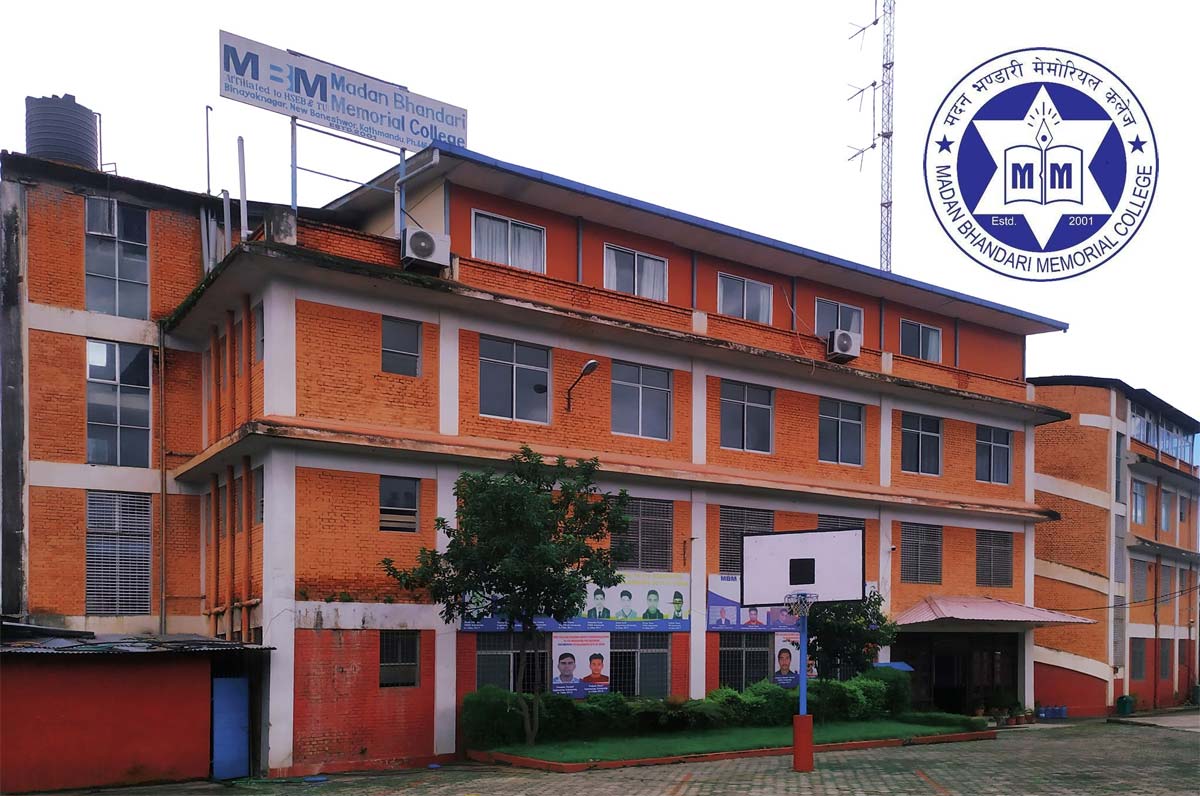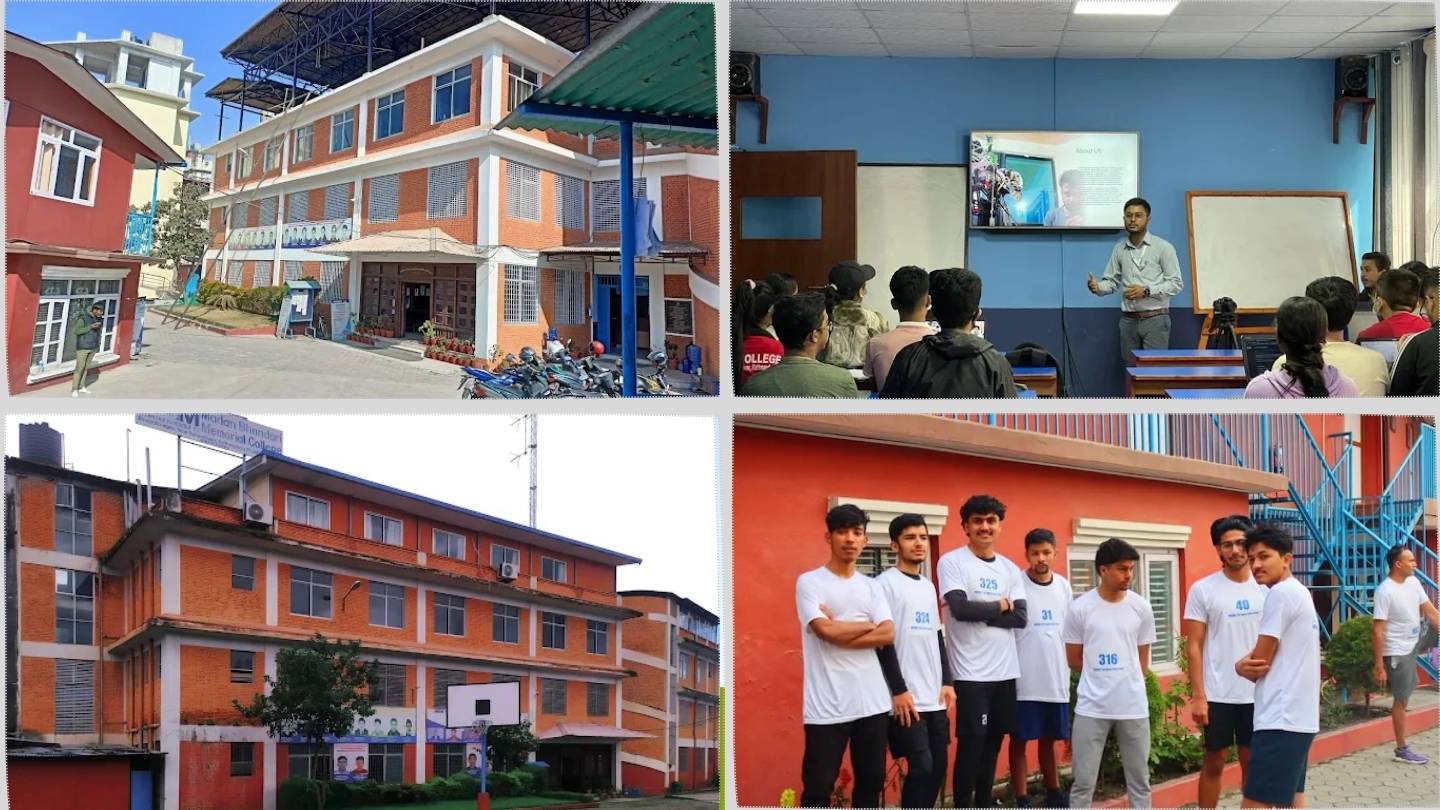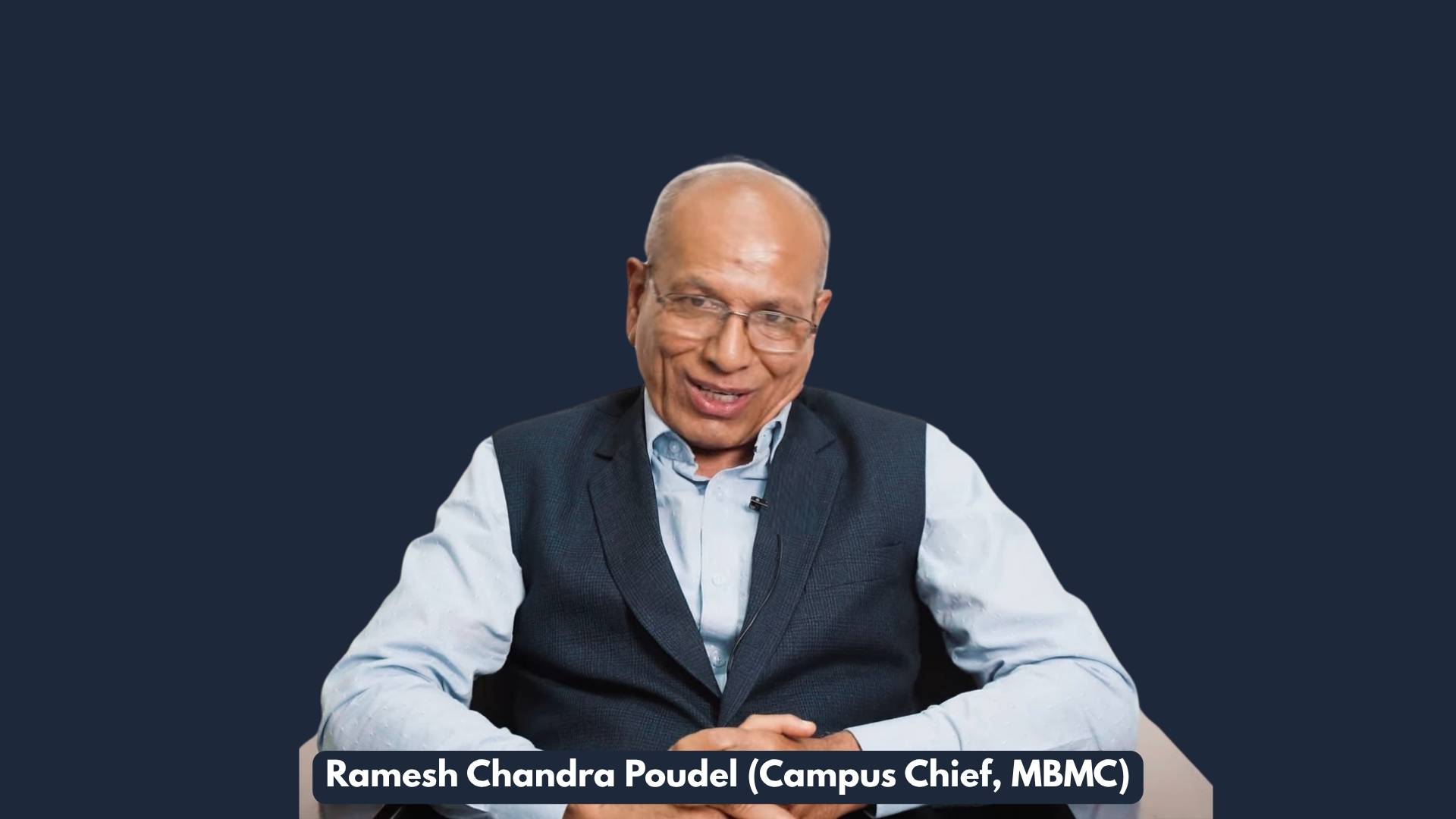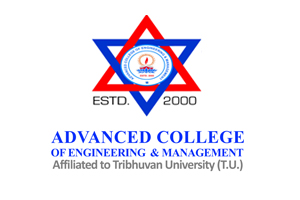Overview
Madan Bhandari Memorial College (MBMC) is a Tribhuvan University–affiliated, community-run campus in New Baneshwor, Kathmandu, offering NEB 10+2 Program (Science, Management, and Education), BA, BBS, BBM, BCA, BSc CSIT, and master’s programs in English, Journalism & Mass Communication, and Sociology. The campus holds UGC Nepal QAA accreditation (Cycle-1, January 2, 2025), a nationally verified quality status.

Overview
MBM College was established in 2001 as a non-profit community institution to expand access to higher education in Kathmandu. The college runs three academic schools—Liberal Arts; Management; Science & Technology—and delivers programs strictly under Tribhuvan University (TU) rules. Teaching combines lectures, seminars, labs, field exposure, research guidance, and assessed coursework. The campus operates Radio Shweta Shardul 93.6 MHz, a community-based studio used as an academic lab for Journalism & Mass Communication and outreach programming.
Governance follows a community campus model: a College Assembly and College Management Committee oversee policy; the Campus Chief leads day-to-day academics and administration with dedicated deputies; an Internal Quality Assurance Cell (IQAC) and Research Management Cell (RMC) support standards, audits, and research culture. This structure aligns institutional processes with national quality benchmarks and TU procedures (Board/Dean’s Offices, institutes, and examination bodies). The QAA status confirms MBMC’s compliance with UGC’s framework on governance, resources, student support, and continuous improvement.
Quick Highlights
-
Institution type: Community (non-profit) campus, affiliated with Tribhuvan University.
-
Accreditation: UGC Nepal QAA—Accredited (Cycle-1) on January 2, 2025; validity through January 1, 2030.
-
Location: Kathmandu Metropolitan City–Ward 10, New Baneshwor, Kathmandu.
-
10+2 Programs: Science, Management, and Humanities
-
Academic schools: Liberal Arts; Management, Science & Technology.
-
Undergraduate programs: BA, BBS, BBM, BCA, BSc CSIT.
-
Postgraduate programs: MA English, MA Journalism & Mass Communication, and MA Sociology.
-
Learning assets: Campus radio (93.6 MHz), computing and science labs, e-enabled classrooms, library, auditorium, sports ground.
-
Student platforms: Silicon Ivy (IT club), MBM IdeaX (national 48-hour hackathon), Student Council.
-
Program frameworks: TU FOHSS (BA, BCA, MA), TU FOM (BBS, BBM), TU IOST (BSc CSIT).
Academic Programs Offered
Ten Plus Two (10+2) Programs under NEB
The college conducts NEB 10+2 in three streams:
-
Science
-
Management
-
Humanities
These programs follow the national curriculum and assessment set by government bodies (CDC/MOEST/NEB). At the 10+2 level, CDC/NEB defines compulsory subjects and stream-specific combinations; institutions deliver coursework and internal assessment as per circulars and syllabi. For example, in the 10+2 phase, compulsory papers include English and Nepali, with stream-appropriate subjects in Science, Management, or Humanities. Subject syllabi are published by CDC and NEB (e.g., Grade 11 Physics and Mathematics consolidated syllabi).
The college publicly announces Grade 11 admissions each year via its official channels.
10+2 Science
Typical subject groups include Physics, Chemistry, Biology, and Mathematics, alongside compulsory papers, all guided by NEB/CDC syllabi and exam standards. Program delivery at MBMC integrates lab work in college laboratories and regular internal assessments in line with MOEST/NEB circulars and CDC course documents.
10+2 Management
Curriculum centers on accounting, economics, business studies, and optional subjects aligned with NEB frameworks. MBMC schedules classroom work with internal assessments and school-level practicals where applicable, following the national syllabus scope and exam calendar.
10+2 Humanities
Streams include literature, social sciences, and allied subjects per NEB curriculum, with compulsory language papers and internal assessments that align with CDC/NEB guidance.
School of Liberal Arts
BA (Bachelor of Arts)
TU’s Faculty of Humanities & Social Sciences (FOHSS) shifted BA to a four-year structure from academic year 2076/77. The program blends language studies, humanities, and social sciences with internal assessment and final examinations set by FOHSS. MBMC typically offers English, Sociology, Social Work, and Mass Communication tracks, subject to annual intake and staffing.
Academic experience:
-
Core and elective papers across literature, society, communication, and Nepali studies.
-
Continuous internal work: class tests, short projects, presentations, and attendance.
-
Final examinations conducted as per FOHSS notices.
Students build analytic reading, clear writing, and field-aware perspectives that suit entry-level roles in content, social sector, local governance, education support roles, and media support units, as well as pathways to MA programs.
MA in English
MA in English at MBM examines literature, cultural texts, rhetoric, and language studies across periods and genres. Structured over four semesters under Tribhuvan University’s Faculty of Humanities and Social Sciences, the program blends internal assessment with end-semester examinations.
Students complete research tasks—short papers, annotated readings, and presentations—that build academic writing and critical interpretation. Teaching takes place through seminars and close-reading workshops, with guided presentations and supervised essays that link texts to historical and contemporary contexts.
Graduates develop clear writing, careful analysis, and confident presentation skills suited to roles in teaching, editing, cultural organizations, media writing, and research assistance, as well as preparation for advanced study.
MA in Journalism & Mass Communication
The MA in Journalism and Mass Communication at MBM runs across four semesters under Tribhuvan University’s Faculty of Humanities and Social Sciences. The curriculum covers newsroom practice, ethics, media research, public communication, digital production, and audience analysis.
Students script programs, record segments, and practice on-air presentation at the campus radio station, gaining studio habits that match real workflows. Assessment blends internal tasks with end-semester examinations.
Graduates move into entry-level reporting, production, newsroom desk roles, community radio programming, content strategy, or communication support positions in NGOs and local bodies.
MA in Sociology
MA in Sociology at MBM focuses on sociological theory, research methods, fieldwork, and data analysis with applied project work in each semester. The degree encourages inquiry into social change, identity, institutions, and public issues, helping students connect concepts with observations from field studies. Evaluation includes internal assignments, presentations, and a final examination conducted under FOHSS rules.
Graduates are prepared for social research support, program facilitation in development organizations, local government projects, and further study leading to MPhil or PhD tracks.
School of Management
BBS (Bachelor of Business Studies)
BBS at MBM is a four-year Tribhuvan University program under the Faculty of Management with the annual examination system. Students study accounting, finance, economics, organizational studies, operations, and business law, with report writing or project components in senior years.
Learning approach at MBMC:
-
Lectures supplemented by case-based discussions and assignments.
-
Internal tests required for exam eligibility, as per campus notices.
-
Exposure to local enterprise contexts through field tasks and short projects.
Graduates build a practical view of business functions suited to roles in accounting support, sales operations, administrative coordination, or small-business work.
BBM (Bachelor of Business Management)
BBM is an eight-semester program with 120 credit hours under FOM. Admission requires the CMAT entrance test administered by FOM, followed by campus selection. The syllabus covers core management, quantitative tools, communication, entrepreneurship, projects, and internship.
Learning approach at MBMC:
-
Classroom work reinforced by presentations, group assignments, and guest talks.
-
Projects and internship build familiarity with Nepali business environments.
-
Student clubs and events support soft-skill growth.
Graduate readiness for early-career roles in marketing support, HR assistance, finance support roles, SME operations, and start-up teams.
School of Science & Technology
BCA (Bachelor of Computer Applications)
BCA (Bachelor of Computer Applications) at MBM is an eight-semester program under FOHSS. Eligibility normally accepts higher secondary or equivalent in any discipline meeting minimum division/grade criteria, along with a program entrance test defined by FOHSS. The curriculum covers programming, database systems, networks, web technologies, and applied computing.
Learning approach at MBMC:
-
Lab-based courses with weekly assignments and code reviews.
-
Internal tests, project submissions, and viva-style checks.
-
Tech talks through Silicon Ivy and cross-team hackathon practice to extend lab learning.
Graduates start as junior developers, QA trainees, support engineers, or web/app developers, with options to continue to postgraduate IT studies.
BSc CSIT (Bachelor of Science in Computer Science & Information Technology)
BSc CSIT at MBM runs eight semesters and 126 credit hours under TU’s Institute of Science and Technology. Evaluation follows the standard split: theory courses carry 20% internal and 80% external; courses with labs carry 20% internal, 20% lab, and 60% external; projects and internships use separate internal and external evaluations.
Learning approach at MBMC:
-
Algorithmic thinking, systems courses, and hands-on labs across semesters.
-
Team projects and internships to build repository-backed portfolios.
-
Participation in MBM IdeaX for problem-solving under real deadlines.
Graduates step into software engineering trainee roles, data and analytics support, network support, or prepare for advanced specialization.
Admission Process
MBMC follows the current rules announced by the respective TU bodies—FOHSS (BA, BCA, MA), FOM (BBS, BBM), and IOST (BSc CSIT). Applicants should track annual notices for eligibility, entrance dates, documents, and intake numbers.
General steps
Check eligibility: Confirm stream, grades/division, and subject prerequisites for the chosen program.
Sit for the entrance test (where required):
-
BBM: CMAT administered by TU FOM.
-
BSc CSIT: IOST entrance.
-
BCA: FOHSS/department entrance as per annual notice.
Campus application & screening: Submit forms with transcripts, certificates, and ID. Shortlisted candidates may attend a brief interview or counseling.
Enrollment: Complete registration within the notified timeline; attend orientation and academic calendar briefings.
Helpful notes
-
Intake windows and quotas vary by year. Follow FOM/FOHSS/IOST circulars for current cycles.
-
Keep copies of migration certificates, character certificates, and standardized photos ready for file verification.
-
For credit transfer or equivalence, consult TU’s dean’s office for the program.
Teaching Faculty and Learning Methodology
Departments are led by coordinators under the Assistant Campus Chief (Academic). Teaching teams include full-time and part-time faculty with subject expertise and TU examination experience.
Learning methods
-
Classroom: Lectures with guided reading, short quizzes, and concept-checking.
-
Problem sessions: Tutorials and mini-workshops that translate theory into practice.
-
Labs: BCA/BSc CSIT labs run weekly schedules for coding, database work, networking, and electronics as applicable.
-
Media practice: Radio scripts, voice training, and production cycles for JMC.
-
Field & project work: Case tasks for BBS/BBM; internships and capstones for BBM and CSIT; short field assignments for BA/MA programs.
Assessment model
Internal evaluation through tests, assignments, and presentations supplements final examinations administered by FOHSS/FOM/IOST. The BSc CSIT evaluation split (20/80; 20/20/60 for lab courses) is standard across IOST colleges; project and internship marks are awarded under joint internal–external evaluation rules.
Academic integrity & research
The RMC hosts short sessions on research ethics, referencing, and manuscript preparation. Departments encourage seminar papers, poster sessions, and student newsletters for early research exposure.
Teaching Faculty and Mentorship
Departments curate semester plans, reading lists, lab schedules, and project calendars. Mentors track progress during internal tests and viva sessions. For writing-heavy courses (English, Sociology, JMC), students receive guidance on argument structure, citation integrity, and data use. For management courses, teams present short cases using Nepali business contexts. For computing courses, repositories and demonstration videos form part of the semester record.
Academic support services:
-
Consultation hours for paper selection and exam planning.
-
Short clinics on TU answer-sheet strategies for finals.
-
RMC-run primers on research design, citation styles, and ethics compliance.
Infrastructure and Learning Facilities
Campus & buildings: The college operates on its own land with multi-storey academic blocks, classrooms, labs, and administrative offices. CCTV coverage supports safety. An auditorium hosts exams, orientations, and cultural programs.
Library & e-resources: A multi-room library with reading space and periodicals supports coursework across schools. On-campus internet access helps students consult TU syllabi and journals.
Computing & labs:
-
Computer labs with modern desktops for programming, database work, and networks.
-
Course-linked equipment and displays (projectors/TV screens) to review code, demos, and presentations.
-
Practical labs for science components in BSc CSIT.
Radio Shweta Shardul 93.6 MHz: A functioning community radio within the campus premises provides an authentic studio for coursework, internships, and live programming. Students script, record, and present shows under faculty supervision.
Sports & student spaces: An open ground is used for sports week, football events, and community gatherings. Common rooms and meeting areas support club activities.
Transport & access: The campus is located in Kathmandu Metropolitan City–Ward 10 with easy public transport links along the Dhobikhola corridor. Contact details and map are published on the official site.
Auditorium: Hosts orientations, viva presentations, guest talks, and literary events.
Classrooms: Display-enabled rooms for code walk-throughs, slide decks, and exam review sessions.
Power backup: Generators and inverters maintain teaching continuity during outages.
Hygiene & access: Separate sanitation, filtered water points, and a monitored cafeteria.
Safety: CCTV with nighttime coverage in common areas.
Contact & map: Official site lists phone numbers, emails, and map embed for route planning.

Student Life and Campus Experience
Clubs & communities:
-
Silicon Ivy (IT Club): Runs coding bootcamps, AI/data sessions, cloud basics, robotics workshops, and code camps as reflected in the college’s academic calendar. Activities often include Git/GitHub practice, Python refreshers, and short build-sprints before exam season.
-
Student Council: Coordinates orientation helpdesks, inter-faculty events, and volunteer drives.
Signature event — MBM IdeaX:
-
Format: A 48-hour on-site national hackathon hosted by MBMC to solve real problems under time-boxed sprints. Editions have featured themes like Indigenous Languages in collaboration with partners; recent cycles include 2023 and 2024/25.
-
Value for students: Team formation, mentor feedback, public demos, and portfolio-ready projects.
-
Visibility: Dedicated website and official social posts guide registration and updates.
Well-being & culture: Sports week, art competitions, and clean-up campaigns foster community spirit. Departments host film screenings, literature circles, and guest interactions.
Publications & showcases: The college shares downloadable issues of Shweta Shardul (institutional publication) on its site, which often features student and faculty writing.
Extracurricular Activities (ECA)
-
Technology & innovation: Silicon Ivy workshops, code camps, and demo days; preparatory tracks aligned to semester calendars.
-
Media practice: News bulletins, feature programs, and community messaging via the campus radio.
-
Sports & fitness: Inter-class tournaments, annual sports week, and friendly matches with neighboring institutions.
-
Community engagement: Clean-up drives, health camps, blood donation events, and disaster-relief support through student volunteers.
-
Career exposure: Guest lectures with alumni, short talks by practitioners, and company visits coordinated by departments.
Student Support, Counseling, and Career Exposure
Counseling: During admission season and ahead of final exams, helpdesks clarify course rules, entrance prep pointers, and document checklists.
Career exposure:
-
BBM/BBS: Internships and fieldwork with local firms; alumni sessions on accounting tools, sales operations, and HR basics.
-
BCA/BSc CSIT: Project defense days, code reviews, and internship showcases; cross-college meets during hackathon season.
-
Liberal Arts: Radio production cycles, reporting assignments, and field notes; short research posters for Sociology and English seminars.
Community Engagement
MBMC continues to support outreach activities such as clean-up campaigns, awareness drives, and health camps. Student volunteers contribute to local events during the academic calendar, and radio programming highlights public-interest topics and campus updates.
Quality Assurance and Accreditation
UGC Nepal QAA: MBMC’s listing appears on the UGC page of QAA-receiving HEIs with the exact accreditation and validity dates. This confirms a campus-wide quality system across instruction, student services, data management, and periodic review.
Internal processes: IQAC leads self-review cycles; departments maintain course files, question banks, and internal marks records. HEMIS reporting is compiled for UGC submissions and public accountability.
Governance and Leadership
MBMC’s site presents messages from the Chairperson (College Management Committee) and the Campus Chief describing the academic mission and the guiding line “Excellence in Leadership for Transformation.” Readers can consult the college site for current office-bearers and detailed messages.
Scholarships and Financial Support
MBMC allocates merit and need-sensitive support based on academic performance, internal exam standings, and social inclusion categories. The campus also guides students toward external scholarships (government offices, municipalities, and public bodies) when calls are announced.
Common categories:
-
Entrance merit within program quotas.
-
Semester/annual toppers and internal test toppers.
-
Support for students from disadvantaged groups where relevant rules allow.
Actual quotas, amounts, and duration change by intake and budget. Applicants should consult the admission desk for the current scholarship notice and required documents.
Achievements and Institutional Milestones
-
UGC Nepal QAA Accreditation: MBMC achieved Cycle-1 accreditation on January 2, 2025. The accreditation list on UGC’s site confirms MBMC’s status and validity through January 1, 2030.
-
Academic expansion in TU frameworks: MBMC runs BA (4-year), BCA under FOHSS, BBS/BBM under FOM, and BSc CSIT under IOST, following official curricula and examination schemes.
-
Innovation exposure: Regular staging of MBM IdeaX as a national 48-hour hackathon; calendar-level listing of Silicon Ivy workshops and code camps.
-
Media laboratory: Ongoing use of Radio Shweta Shardul 93.6 MHz for teaching, internships, and community information.
Why Choose MBMC?
-
Accredited status: MBMC’s UGC QAA recognition signals a campus that meets national benchmarks across governance, teaching–learning, resources, and student support.
-
Program breadth: Choice of humanities, management, and computing tracks under TU.
-
Learning-by-doing: Lab courses, projects, internships, radio studio practice, and hackathons.
-
Access and community: Central Kathmandu location with strong public transport and active neighborhood engagement.
-
Student platforms: Clubs and calendars that create regular touchpoints for skills and networking.
Message from Campus Chief (Ramesh Chandra Poudel)

Madan Bhandari Memorial College was founded by respected figures, professors, educationists, and social workers to make higher education in Nepal accessible, affordable, and of good quality. The college is community-based and operates on a hybrid model that follows effective practices from both university constituent colleges and institutionally run private colleges. This approach has made the college a preferred choice for many students.
We are a multidisciplinary institution offering studies from Ten Plus Two (+2) up to the Master’s level. At the +2 level, we run programs in Science, Management, and Liberal Arts. Within these streams, we offer specializations such as Hotel Management and Computer Science, along with other supportive subjects.
At the bachelor’s level, we offer English; Journalism & Mass Communication; Sociology; and Social Work under Liberal Arts; BBA and BBS in Business Management; and BCA, BSc CSIT, and a Bachelor’s in Information Technology and Communication in Information Technology. At the master’s level, we currently run English, Sociology, and Journalism & Mass Communication. In the near future, we are working to introduce programs such as BBA, BIT, MBS, and other new subjects based on feasibility, alongside teaching and research activities.
Our fee structure is moderate and affordable. As a community-based institution, we cover all teacher and staff expenses from student fees; however, through cost prudence, we collect only the minimum required for essential staff welfare and the academic development of the college. Because we charge only what is necessary for operations, our fees are roughly about half of those at private-sector colleges while maintaining quality instruction.
We have a scholarship fund for meritorious students and for those from remote areas, weaker sections, and deprived classes. From this fund, we compensate eligible students’ fees. We also recommend students for various scholarships in medicine, engineering, management, and the social sciences. Dozens of students have benefited from these scholarship schemes.
We provide quality teaching at a low fee through experienced and trained faculty who focus on systematic instruction. Moving beyond lecture-only methods, we employ multimedia, group discussions, role plays, field visits, and workplace-based practice. These methods have significantly raised our students’ academic level.
We conduct workshops, seminars, and training programs that help students advance practically and succeed professionally. We also run extensive extracurricular activities, including sports, music, dance, elocution contests, and other competitions. Our IT students have reached the Microsoft Student Innovator level.
We collaborate with national and international institutions through Memoranda of Understanding and carry out joint activities under these agreements. As a multidisciplinary college, we include Liberal Arts, a School of Science and Technology, and a School of Business Management. Students enrolled in one faculty can learn across areas—for example, business students can study information technology, computer education, society, or Nepal’s history and culture, while science students gain basic knowledge of liberal arts and liberal arts students can study management and science.
The college is centrally located in the city, about 100 meters east of Singha Durbar, and is connected by transportation networks from all sides. This makes commuting convenient for students and guardians.
We warmly invite parents and prospective students to visit the college and discuss their goals with us. If the college meets your expectations, we will strive to help you become well-educated and successful in your chosen profession.
Conclusion
Madan Bhandari Memorial College offers NEB Ten Plus Two (Science, Management, Humanities) to Tribhuvan University undergraduate and postgraduate students. The college operates as a community institution with QAA accreditation, corresponding to each program with national curricula and defined evaluation rules. Teaching and assessment combine classroom work, labs, field tasks, projects, and internal tests with university-administered finals. Facilities—computing and science labs, a multiroom library, and a campus FM station—support practical learning in both technology and liberal-arts fields. Student platforms such as Silicon Ivy and MBM IdeaX add hands-on experiences that translate classroom theory into visible outcomes.
FAQ
1) Is MBMC accredited?
Yes. MBMC is QAA-accredited by UGC Nepal (Cycle-1) dated January 2, 2025, valid to January 1, 2030.
2) Which university is MBMC affiliated to?
Tribhuvan University. All programs run under TU regulations and syllabi.
3) What undergraduate programs are available?
BA, BBS, BBM, BCA, and BSc CSIT. Program frameworks and examinations follow FOHSS, FOM, and IOST, respectively.
4) What postgraduate programs are available?
MA in English, MA in Journalism & Mass Communication, and MA in Sociology under FOHSS semester rules.
5) How do admissions work for BSc CSIT, BCA, and BBM?
BSc CSIT requires an IOST entrance; BCA follows FOHSS entrance procedures; BBM requires the CMAT entrance (FOM). Check annual notices for dates and eligibility.
6) What are the credit hours and evaluation splits in BSc CSIT?
Total 126 credits; theory courses carry 20% internal + 80% external; courses with labs carry 20% internal + 20% lab + 60% external. Projects and internships follow joint evaluation guidelines.
7) How many credits does BBM have?
120 credits over eight semesters with project and internship components.
8) What practical platforms exist on campus?
Campus radio for JMC training, computing/science labs, and the MBM IdeaX hackathon for cross-disciplinary problem-solving.
9) Does MBMC provide scholarships?
Yes. Merit- and need-based support is announced each intake. Applicants should consult the latest campus notice for categories and documents.
10) Where can I verify that BA is now a four-year degree?
FOHSS announced the four-year BA from the academic year 2076/77.
11) What student clubs and events are active?
Silicon Ivy (IT club) runs workshops and code camps; MBM IdeaX organizes a national 48-hour hackathon.
12) How do I contact the college?
Use the Contact page on the official site for phone, email, and map to the campus in Ward 10, New Baneshwor.
Contact Madan Bhandari Memorial College's administrative office for detailed information on the course, admissions, location, fees, scholarships, facilities, counseling, or eligibility.
Courses Offered
Madan Bhandari Memorial College
Email Address: info@mbmc.edu.np
Phone Number: +977-1-5172175, +977-1-5172715
Website: https://www.mbmc.edu.np
Location: Binayaknagar, New Baneshwor, Kathmandu

















